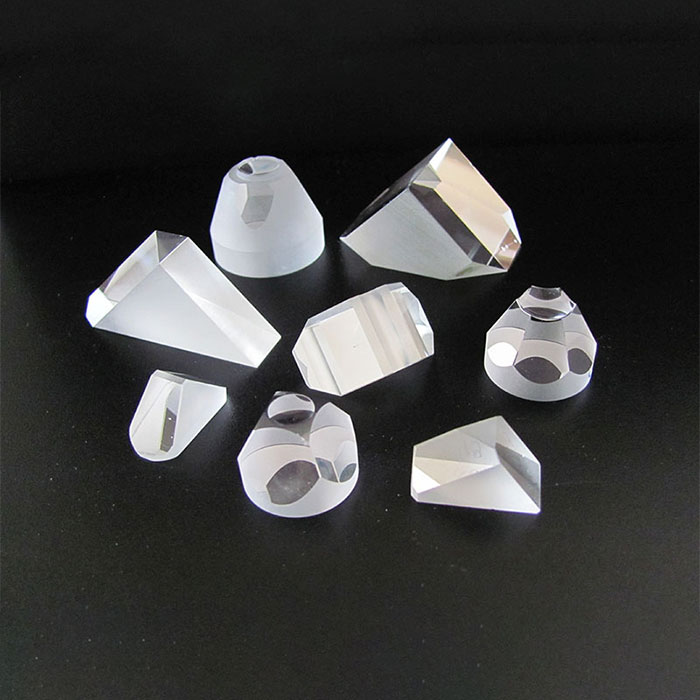Prisms
They are used in optical devices for various purposes: in observational optical devices, optical devices for recording images on electronic receivers, complex multifunctional optical devices.
Certificated



A prism is an optical element of a transparent material in the form of a geometric body having flat, polished edges through which light enters and emerges. The light in the prism is refracted. The most important characteristic of the prism is the refractive index of the material from which it is made, the accuracy of the angles, the resolution.
The material used is mineral optical glass, quartz glass, Cerodur, Sitall.
Types of prisms:
- rectangular prisms
- roof prisms
- blocks of prism
- oblique angled prisms
- pentaprism
- octagons
- rhombic prism
- hexagon
- beam splitting cubes
- light reflective prisms, trippel-prisms (retroreflectors)
- 3-mirror and 4-mirror prisms-lenses (analogs of prisms according to Goldman and Van Beuningen)
Technical specifications
| Accuracy of angle dimensions | From 2” |
| Dimension tolerance, mm | ±0,03 |
| Surface flatness | N=0,1 (λ/20) |
| Surface quality | In accordance with GOST 11141 |
| Deviation of the inlet and outlet beam | ± 2” |
| Coating | Ref. to our coating catalog (page 14) |
Optical Vacuum Coatings
| Coating | Substrate | Type of component (lens, cemented lenses, prism, cemented prisms,
plane-parallel plates) |
Spectrum characteristics of the coatings | Overall dimensions, mm |
| 1 | 2 | 3 | 4 | 5 |
| AR coating | ||||
| 1.Single wave coating.
The coating provides antireflection for a single wavelength. |
Optical glasses with a refractive index nе from 1,44 to 1, 8138 | Lenses, plates, wedges, prisms | – R ≤ 0,3 % for λ = 550 nm
– R ≤ 0,3 % for λ = 632,8 nm – R ≤ 0,3 % for λ = 650 nm – R ≤ 0,3 % for λ = 720 nm – R ≤ 0,3 % for λ = 808 nm – R ≤ 0,3 % for λ = 860 nm – R ≤ 0,3 % for λ = 1060 nm – R ≤ 0,3 % for λ = 1064 nm – R ≤ 0,3 % for λ = 1540 nm
|
Lenses: from Ø 5 mm to Ø 80 mm.
Plates, wedges: – from Ø 5 mm to Ø 80 mm; – from 8х8 mm to 70х70 mm.
Prism types АР-90°, АР-0°, БР-180°, БС-0°, АкР-90°, БП-90°: Size of the sides – from 7х7 mm to 40х40 mm.
Diameter from 3 mm to 8 mm, length from 50 mm to 80 mm. |
| 2. Multiwave and broadband antireflection. The coating provides antireflection for two or more wavelengths. | Optical glasses with a refractive index nе from 1,44 to 1, 8138
К8, silica
KGW |
Lenses, plates, wedges, prisms
Active elements |
– Rср. ≤ 0,5 % for ∆λ = (420 – 700) nm
– Rср. ≤ 0,5 % for ∆λ = (650 – 1000) nm. – RА ≤ 0,8 %.
– Rλ ≤ 0,5 % for λ=755 nm and λ=1064 nm
– Rλ ≤ 1 % for λ = 1064 nm – Rλ ≤ 0,5 % for λ = 1351 nm – Rλ ≤ 0,5 % for λ = 1538 nm |
|
| High-reflection coating | ||||
| 1. Metal-dielectric coatings | К8 | Plates, prisms | – Rλ ≥ 99 % for λ = 1064 nm
– Rλ ≥ 96 % for λ = 1067 nm, α = 45°. – Rλ ≥ 96 % for λ = 1067 nm, α = 48°. – Rλ ≥ 96% for ∆λ=(600–700)nm, α = 45°. – Rλ ≥ 96 % for λ = 632,8 nm – Rλср. ≥ 93 % for ∆λ = (480 – 650) nm – RА ≥ 90 %, α = 45°.
|
Plates:
– from Ø 5mm to Ø 80 mm; – from 8х8 mm to 70х70 mm.
Prism types АР-90°, Ар-0°, БР-180°, БС-0°, АкР-90°, БП-90°: Size of the sides – from 7х7 mm to 40х40 mm. |
| 2. Dielectric coatings | К8
|
Lenses, prisms, plates | – Rλ ≥ 96 % for λ = 632,8 nm
– Rλ ≥ 90 % for ∆λ = (640 – 690) nm – Rλ ≥ 90 % for λ = (500 – 550) nm – Rλ ≥99% for λ=755nm and for λ=1064 nm – Rλ ≥ (95 ± 1) % for λ = 1064 nm – Rλ ≥ 99 % for λ = 1064 nm |
|
| Beam-splitting coating | ||||
| 1. For unpolarized radiation | К8
К8
К8
|
Prisms (measured on glued prisms at the angle of incidence of radiation α = 45 ° to the hypotenuse)
Lenses, plates (measured R at an angle of incidence of radiation α = 8°, measured T at an angle of incidence of radiation α = 0°)
Plates (measured at the angle of incidence of radiation α = 45°)
|
– Т = (50 ± 5) % for λ = 540 nm
– Т = (47 ± 3) % for λ = (530 ± 30) nm – Т = (50 ± 5) % for λ = 680 nm – Тср. = (70 ± 5) % for ∆λ = (400–750) nm – Т = (86 – 90) % for λ = (540 ± 10) nm – Тср. = (28 – 35) % for ∆λ = (420–820) nm – Тср. ≥ 70 % for ∆λ = (475 – 625) nm Т ≤ 30 % for λ = 1064 nm
– Rλ = (10 ± 3) % λ = 1060 nm – Rλ = (25 ± 5) % for λ = 1060 nm – Rλ ≤ 10 % for λ = 560 nm, Rλ ≥ 70 % for λ = 660 nm – Т∆λ. ≥ 75 % for ∆λ = (420 – 615) nm, Т ≤ 30 % for λ = 650 – 670 nm – R∆λ. ≤ 15 % for ∆λ = (400 – 550) nm, R ≥ 85 % for ∆λ = 630 – 670 nm
– Т∆λ. ≤ 10 % for ∆λ = (600 – 700) nm, Т ≥ 94 % for λ = 1067 nm
|
Prism types АР-90:
Size of the sides -from 7х7 mm to 40х40 mm.
Lenses: from Ø 5m to Ø 80 mm. Plates: – from Ø 5 mm to Ø 80 mm; – from 8х8 mm to 70х70 mm.
Plates: – from Ø 5 mm to Ø 80 mm; – from 8х8 mm to 70х70 mm. |
| 2. For polarized radiation | К8
ТК121
К8
К8
К8 |
Prisms (measured on glued prisms at the angle of incidence of radiation α = 45° ° to the hypotenuse)
Prisms (measured on glued prisms at the angle of incidence of radiation α = 48°57′ ° to the hypotenuse)
Prisms (measured on glued prisms at the angle of incidence of radiation α = 34°50′ ° to the hypotenuse)
Prisms (measured at the angle of incidence of radiation α = 45°)
|
– Rs/Ts = 2 ÷ 4 for λ = 633 nm
– Rs/Ts = 0,6 ÷ 1 for λ = 633 nm – Rs/Ts = 0,8 ÷ 2 for λ = 633 nm
– Тр ≥ 90 % and Ts ≤ 2 % for ∆λ = (900 ± 25) nm
– Тs = (45 – 56) % for λ = 633 nm
– Тs = (63 – 70) % for λ = 633 nm
– Тр = (51 ± 5) % and Ts = (48 ± 5) % for λ = 633 nm
|
Prism types
АР-90: Size of the sides -from 7х7 mm to 40х40 mm. Prism types АР-90: Size of the sides – от 7х7 mm to 40х40 mm. Prism types АР-90: Size of the sides -от 7х7 mm to 40х40 mm. Prism types АР-90: Size of the sides – от 7х7 mm to 40х40 mm.
Plates: – from Ø 5 mm to Ø 80 mm; – from 8х8 mm to 70х70 mm.
|










